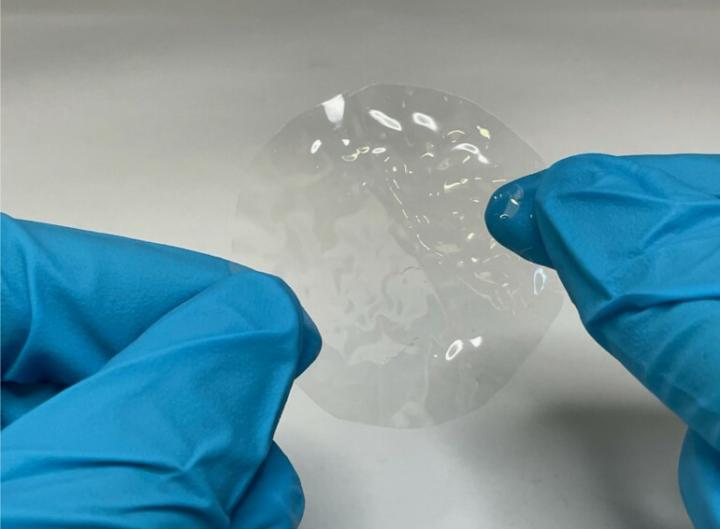Göttingen University researchers create new kind of environmentally friendly bioplastic with hydroplastic polymers

Credit: K Zhang
Plastics offer many benefits to society and are widely used in our daily life: they are lightweight, cheap and adaptable. However, the production, processing and disposal of plastics are simply not sustainable, and pose a major global threat to the environment and human health. Eco-friendly processing of reusable and recyclable plastics derived from plant-based raw materials would be an ideal solution. So far, the technological challenges have proved too great. However, researchers at the University of Göttingen have now found a sustainable method – “hydrosetting”, which uses water at normal conditions – to process and reshape a new type of hydroplastic polymer called cellulose cinnamate (CCi). The research was published in Nature Sustainability.
Plastics are polymers, meaning that their molecular structure is built up from a large number of similar units bonded together. Currently, most plastics are manufactured using petrochemicals as raw materials, which is damaging to our environment to both extract and dispose of. In contrast, cellulose, which is the main constituent of plant cell walls, is the most abundant natural polymer on earth, constituting an almost inexhaustible source of raw material. By slightly modifying a very small portion of the chemistry of cellulose by introducing a “cinnamoyl” group, the researchers succeeded in making a specific CCi that is suitable for the formation of a new type of bioplastic with hydroplastic (ie soft and mouldable on contact with water) polymers.
This means that it can be moulded using little more than water at everyday temperature and pressure. This unique method – known as hydrosetting – enabled the researchers to produce a variety of shapes simply by immersing the bioplastic in water and leaving it to dry in the air. The moulded shapes kept their stability in the long-term and could be reshaped over and over again into a variety of 2D and 3D shapes. Although the plastic should not be used for direct contact with water – because it will lose its shape – it can hold water and be used in humid conditions. The CCi bioplastics showed high quality mechanical properties when compared with plastics that are currently widely used.
“Our research provides a feasible method to design other eco-friendly hydroplastics from renewable resources,” explains Professor Kai Zhang from the University of Göttingen. “This should open up new avenues of research, stimulating further exploration of other sustainable bioplastics with superior mechanical properties and new features.”
The hydrosetting process avoids expensive and complex machinery and harsh processing conditions. This eco-friendly method highly simplifies plastics manufacture, making their processing and recycling more economical and sustainable. “This research offers tremendous potential for bioplastics like this to be applied in many different situations, such as biology, electronics and medicine,” says Zhang before adding: “In particular, the detrimental effects of plastics on the environment, which is damaging to all forms of life on earth, would be minimized by reusing hydroplastics with their unique features.”
###
Original publication: Jiaxiu Wang, Lukas Emmerich, Jianfeng Wu, Philipp Vana and Kai Zhang, “Hydroplastic polymers as eco-friendly hydrosetting plastics” 2021, Nature Sustainability, DOI: 10.1038/s41893-021-00743-1. Or see the website: https:/
Contact:
Professor Kai Zhang
University of Göttingen
Department of Wood Technology and Wood-based Composites
Faculty of Forest Sciences and Forest Ecology
Büsgenweg 4, 37077 Göttingen, Germany
Tel: +49 551 39 24505
Email: [email protected]
https:/
Media Contact
Melissa Sollich
[email protected]
Original Source
https:/
Related Journal Article
http://dx.




